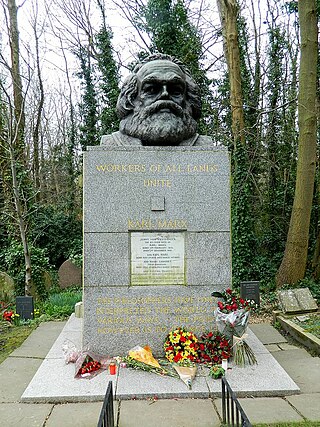The Communist League was one of the first Trotskyist groups in Britain, formed in 1932 by members of the Communist Party of Great Britain in South London, including Harry Wicks, who had been expelled after forming a loose grouping inside the CPGB known as the Balham Group. This became the British Section of the International Left Opposition and adopted the name Communist League in June 1933. They published a monthly newspaper, Red Flag, and a quarterly journal, The Communist.

The Democratic Socialist Party (DSP) was a small left-wing political party in the Republic of Ireland. The party was formed by a merger of Jim Kemmy's Limerick Socialist Organisation and the Socialist Party of Ireland. Jim Kemmy was an Irish politician and member of Dáil Éireann. He left the Labour Party in 1972. A number of members of the British and Irish Communist Organisation also joined the party.
The Irish Workers' Group (IWG) was a Marxist political party in Ireland. It originated as the Irish Workers Union, which later called itself the Irish Communist Group, and contained a variety of people who all considered themselves to be Marxists. Some were from an Irish Republican background, and some, including Gerry Lawless, also became involved in Saor Éire.
The Workers Party of Scotland or Workers Party of Scotland (Marxist-Leninist) was a small anti-revisionist Marxist-Leninist political party formed in 1966 and based in Scotland.

The Communist Workers' Organisation (CWO) is a British left communist group, founded in 1975, and an affiliate of the Internationalist Communist Tendency, formerly the International Bureau for the Revolutionary Party. It publishes a quarterly magazine called Revolutionary Perspectives and distributes the agitational broadsheet Aurora. Works of the CWO and ICT have been cited in various academic and political sources internationally, across several countries and languages. The organisation has its origins in north England and Scotland, though it has since grown to encompass other areas with members and sympathisers across the world.
The British and Irish Communist Organisation (B&ICO) was a small group based in London, Belfast, Cork, and Dublin. Its leader was Brendan Clifford. The group produced a number of pamphlets and regular publications, including The Irish Communist and Workers Weekly in Belfast. Τhe group currently expresses itself through Athol Books with its premier publication being the Irish Political Review. The group also continues to publish Church & State, Irish Foreign Affairs, Labour Affairs and Problems.
The League for a Workers' Republic (LWR) was a Trotskyist organisation in Ireland.
The Working People's Party of England (WPPE) was a Marxist-Leninist political party in England.
The Marxist Group was an early Trotskyist group in the United Kingdom.
The Plebs' League was a British educational and political organisation which originated around a Marxist way of thinking in 1908 and was active until 1926.

William Paul Cockshott is a Scottish academic in the fields of computer science and Marxist economics. He is a Reader at the University of Glasgow. Since 1993 he has authored multiple works in the tradition of scientific socialism, most notably Towards a New Socialism and How the World Works.
The Communist Workers League of Britain (Marxist–Leninist) (CWLB) was a Maoist political party in Britain.
The Association of Communist Workers was an anti-revisionist political party in the United Kingdom.
The Revolutionary Communist League of Britain was a Maoist political party in Great Britain, formed in 1977.
The first Revolutionary Socialist League (RSL) was formed in early 1938 by the merger of the Marxist League led by Harry Wicks and the Marxist Group led by C. L. R. James.
The Irish Marxist Society was a Eurocommunist organisation active in Ireland in the 1970s.
The Militant Christian Patriots (MCP) were a short-lived but influential anti-Semitic organisation active in the United Kingdom immediately prior to the Second World War. It played a central role in the ultimately unsuccessful attempts to keep the UK out of any European war.

Far-left politics in the United Kingdom have existed since at least the 1840s, with the formation of various organisations following ideologies such as Marxism, revolutionary socialism, communism, anarchism and syndicalism.




